#white slave for arab men
Explore tagged Tumblr posts
Text

My husband treated me like a queen, little did he know. He could never feed my urges.
#hijab#arab men#black owned#nbwo#white women black men#arab superiority#arab master#roleplay#breeding pet#mnwo#muslim supremacy#muslim superiority#islamic#islam#say no to white bois#white girls gone black#bbc breeding#interracial breeding#bbc bull#bd/sm master#black cock only#muslim#use my throat#free use cnc#cnc free use#free use kink#slap my face#slap my ass#bd/sm slave#rough cnc
371 notes
·
View notes
Text
And when I get my all black interview with the vampire remake ala the wiz then what
#listen there truly is so much you can do with blackness and itwv#even what we get with louis and his own struggles with race and racism in the show like lets not stop there#and i thunk it is a great way to get more black fans 1) involved 2) in creative spaces cus imma be real. i dont wanna see more white lestats#like lestat as an alexander dumas type has been rattling around my brain for months i need people to see the vision#i also just see it more as a way to look at how slavery and its legacies have forever warped how the Diaspora interrelates#not only slavery but french colonialism as well. what does it mean to be a free man of color when your cousins are being sold off?#what does it mean to be Haitian in spaces like aristocratic colonial france?#how does the arab slave trade factor in?#like there are so many good points of meta we could do if people weren't obsessed with woobyfying white men in this fandom#hell even the notion of passing in itwv is deeply intriguing#interview with the vampire#iwtv#amc iwtv
17 notes
·
View notes
Text

Praise Allah, do what you will with me
#mnwo#muslim superiority#muslim supremacy#white girls gone black#bbc breeding#breeding pet#interracial breeding#say no to white bois#submisive and breedable#thicc white women#slap my face#arab men#islamic#islam#interracial snowbunny#slap my ass#submit#arab superiority#arab master#middle east#bd/sm slave#praise allah#allah#phat ass white girl#black owned#bbc#white women black men#use my throat#throat goat#older man younger woman
264 notes
·
View notes
Text
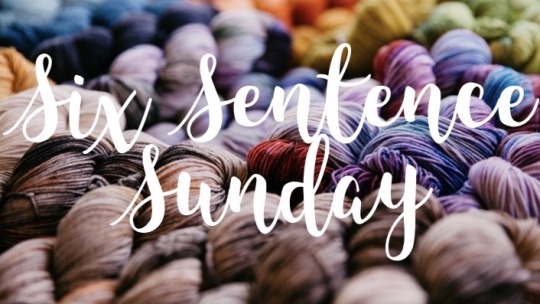
Six Sentence Sunday
thanks for tagging me @run-for-chamo-miles @that-disabled-princess and @orange-peony!
classicstober 2024's prompts have been announced and i'm super excited because it's historical figures! my obsession with Roman non-fiction and biographies has finally paid off!
i thought it would be a good opportunity to jumpstart my writing brain by writing lots of short and snappy things. and so today, i've written 1000 or so words for Regina of South Shields, who i've had the pleasure of visiting!
i'm about to ramble, so i'm putting it under a cut. also warning, i've included photos of a tombstone and a human skeleton. if you just want to read the six sentences and not see them, scroll fast right to the bottom.
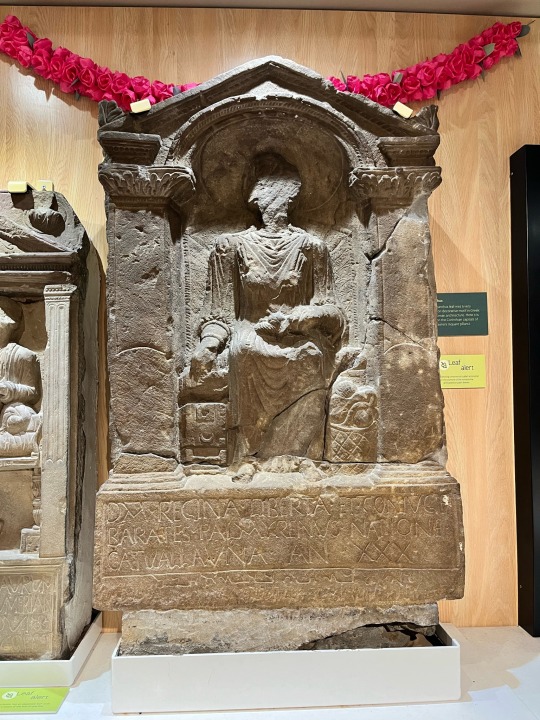
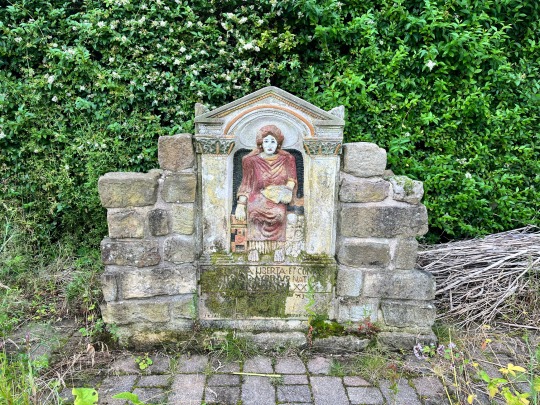
so, this is Regina. or rather, her tombstone, discovered by builders in 1878, and a reconstruction of how it might have looked when it was erected. if you haven't heard of her, which is understandable, she was a British woman from modern day St Albans (near London) during the Roman occupation of Britain. she was sold as a slave (did her family need money? was she born a slave? we don't know) and bought by a man named Barates, from Palmyra, a city in modern day Syria, who was either a soldier or at least travelling with the Roman army. they moved to a garrison close to Hadrian's Wall in what is now South Shields in the north east, and Barates fell in love with Regina. he freed her and they got married.
her tombstone is mostly important because it tells us that a Syrian man was in Britain during this time, and since her tombstone has Palmyrene script on it, and the chances he engraved his own wife's tombstone are slim, there was likely at least one other Syrian person who could engrave headstones around. which suggests that there was a whole group! the name of the Roman fort in South Shields was Arbeia, which could even mean "the place of the arabs."
it's estimated that a third of people in Britain during the Roman occupation were long distance migrants, and most were not slaves, as is often assumed. Ivory Bangle Lady, who I have also visited in York Museum and who lived around the same time, is believed to have come from Africa. and she was a wealthy free woman!
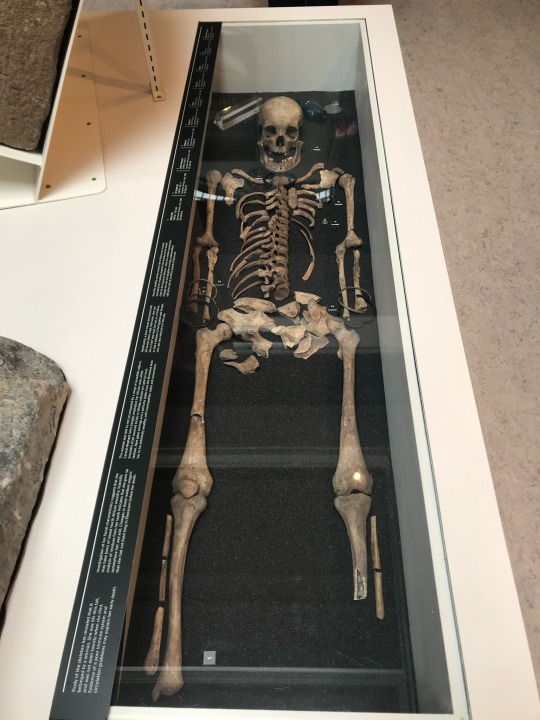
but what about Regina? well, we know she was from the Catuvellauni tribe, and that she died aged 30. we can assume she spun wool as she's depicted doing so on the tombstone, which was a respectable pastime for Roman women, and she's shown wearing lots of jewellery, so she probably led a comfortable life.
but we don't know how she felt about her marriage, as her tombstone is in Barates' words. did she love him back, or was she under duress to marry him to improve her own prospects? did they have children? did she have friends in Arbeia? did she have to learn Aramaic or Latin to communicate with Barates, or did he know Celtic? we simply don't know. so much of her personality has been lost to time.
so my challenge was to write something that pieces together various possibilities to create what could be an approximation of who Regina was. to give her some life, a voice, and at least a bit of agency.
okay. enough preamble. here's six lines:
I had grown and reached my twentieth year, and as the dark circles beneath my eyes disappeared and the warmer months led me to abandon my woollen cloak, I noticed men's behaviour towards me change. I am not the type to play at being coy- I knew they found me attractive. With my white skin, red hair, and pale blue eyes, I was exotic to them. I stood out.
I noticed Barates' behaviour change too. I realised I had a choice to make.
if you want to know more about Regina, my main source is this podcast by Mary Beard, but i also took inspiration from the book Roman Woman by Lindsay Allason-Jones.
tags: @forabeatofadrum @j-nipper-95 @artsyunderstudy @prettygoododds @confused-bi-queer @imagineacoolusername @ic3-que3n @aristocratic-otter @larkral @hushed-chorus @ivelovedhimthroughworse @shemakesmeforget @fatalfangirl @ebbpettier @you-remind-me-of-the-babe @cutestkilla @youarenevertooold @alexalexinii @shrekgogurt @bookish-bogwitch @thewholelemon @supercutedinosaurs @shutup-andletme-go @theearlgreymage @ileadacharmedlife @alleycat0306 @carryonsimoncarryonbaz @comesitintheclover @noblecorgi @roomwithanopenfire and @blackberrysummerblog
28 notes
·
View notes
Text
i just now learned about a recent case where a german man kidnapped and did unspeakable acts to two boys. one was german, one was a refugee. the first one was immediately treated as a missing case, but the second one was not because the cops were afraid the mother was hiding her son to avoid deportation. and the worst part is, that little boy was kidnapped in a government institution (lageso in berlin) where his mother went for help! its infuriating beyond belief.
racism is so deeply engrained in german institutions, its not funny. yet police refuses any reforms or real investigations and deny even the notion - despite mounting evidence - that there is an issue with systemic racism in german police. and we dont have an independent institution to control the cops, you know who investigates their failures and issues? other cops. and we all know how they stick together like literal shit.
but it also made me think about „missing white woman syndrome“. does anyone really care about an eastern european white woman who goes missing while being exploited in the west through prostitution, in the domestic field, nursing, or as a „mail bride“ dependent on her husband? does anyone care about a white woman in the usa going missing from a trailer park? does anyone care about a white woman who was homeless, mentally ill, drug addicted, disabled, impoverished, prostituted, or otherwise marginalised going missing? and do people not care about white men going missing?
and it also made me think about this current trend of oversimplifying and decontextualising racism. one thing i hope we all can agree on is that anti black racism is very persistent. i cant think of a single country where black people are treated preferably over other races, best case is to be treated equally as a black person, and even that is not the case in most countries. but this doesnt just apply to white majority countries. in japan or korea, or under the kafala system in the arabic gulf states, for example, black people are systematically discriminated against and exploited too. white people are also not the only ones guilty of colonialism and imperialism - albeit i dont want to minimise the scale of portugese, spanish, french, british/australin, german, dutch, belgian (neo)colonialism or the north american slave trade.
i dont know its just, everything always has to be put in context and looked at from an intersectional perspective but i feel a lot of people who fault white supremacy for everything dont do that. and dont get me wrong, white supremacy is the root of a lot of inequality and issues, but despite the name its not merely a black and white problem, its complex. for example, even if a roma or jewish person is white, neonazis dont consider them the same race as white people. or i remember my turkish professor once saying, „in turkey im considered white, but in germany im a person of colour“. because race is not just phenotype, it is also culture, nationality, location and ethnicity that matters for who is holding power and privilege.
meanwhile a lot of the same people will refuse to agree that sex matters. or claim that sex - which is a lot less ambiguous than race by the way and nobody argues that mixed race people prove that race is not real or doesnt matter the way they argue intersex people prove that sex is not real or doesnt matter - is a spectrum while chanting „black lives matter“. and i know that black communities do have that conversation about colourism and how whiteness is something even people of colour are supposed to „strive for“, which is why for example the harmful practice of bleaching your skin exists. so it is being acknowledged that race is a spectrum, but some of the same people who rightfully talk about black lives and how blackness is its own social category will call you a bigot for talking about female lives and how being female is a social category.
im not going anywhere with this, just some thoughts that came up regarding discussions on racism and sex and how they intersect too. feel very free to chime in especially as a person of colour obviously!
37 notes
·
View notes
Text
"In the late 6th century, a new monotheistic religion called Islam was founded by its prophet Muhammad, whose followers became known as Muslims. Muhammad united the tribes of Arabia into a religious polity, a caliphate, whose domains he and his successors extended into a vast empire through holy war (jihad).[296][ci] They conquered Palestine in 636 to 640.[247][cii][ciii]
Society in the caliphate formed a pyramid with five layers.[297] Arabs were at the top, followed by converts to Islam (mawali) (this distinction disappeared after the Abbasids seized power).[297] Below them stood dhimmis, followed by non-Muslim free men and slaves at the bottom.[297] The dhimmi (meaning "protected person") were Christians, Jews, and Samaritans, who the Muslims designated as "peoples of the Book" (ahl al-kitab), meaning that they, like the Muslims, based their worship on a book God had given to them, which, in its essence, was identical to the Koran.[298] Unlike the previous rulers, the Muslims allowed them to practice their religions in peace. However, non-Muslim men had to pay a special tax (jizya) and they had to be submissive to Muslims.[298][civ] Dress regulations were imposed on non-Muslims, but it is uncertain whether they were ever enforced in Palestine.[299][cv] Muslim men were permitted to marry non-Muslim women even if the latter choose to remain in their faith. Muslim women, however, could not marry non-Muslim men, unless they first converted to Islam.[300][cvi] The Muslims also lifted the Romans' centuries-long ban on Jews in Jerusalem.[301]
The Muslims organized the territory of the Byzantine Dioceses Orientes (Syria) into five military districts, or provinces (jund, pl. ajnad).[302][cvii][cviii] The territory of Palaestina Prima and Palaestina Tertia became Jund Filastin and stretched from Aqaba in the south to the lower Galilee in the north and from Arish in the west to Jericho in the east.[303][cix] The Tulunids later expanded the borders of the province eastwards and southwards to include regions in modern-day southern Jordan and north-western Saudi Arabia.[304][cx] The newly founded city Ramla became Jund Filastin's administrative capital and most important city.[305] Jund al-Urdunn corresponded with Palaestina Secunda, covering most of the Galilee, the western part of Peraea in Transjordan, and the coastal cities Acre and Sur (Tyre).[306] Tabariyyah (Tiberias) replaced Scythopolis as the province's capital.[307]
Throughout the period, Palestine was a sort of gold mine for the caliphate and among its most prosperous and fertile provinces.[308] Palestine's wealth derived from its strategic location as a hub for international trade, the influx of pilgrims, its excellent agricultural produce, and from a number of local crafts.[309] Products manufactured or traded in Palestine included building materials from marble and white-stone quarries, spices, soaps, olive oil, sugar, indigo, Dead Sea salts, and silk.[310] Palestinian Jews were expert glassmakers whose wares became known as "Jewish glass" in Europe.[311] Palestine was also known for its book production and scribal work.[312]
The Muslims invested much effort in developing a fleet and in restoring seaports, creating shipyards, fortifying coastal cities, and in establishing naval bases in Palestine.[313] Acre became their chief naval base from which a fleet set out to conquer Cyprus in 647.[314] Jaffa came to replace Caesarea as Palestine's main port due to its proximity with Ramla.[315]
Though Palestine was now under Muslim control, the Christian world's affection for the Holy Land continued to grow. Christian kings made generous donations to Jerusalem's holy sites,[cxi] and helped facilitate the ever increasing pilgrimage traffic.[317][cxii] Pilgrims ventured for the adventure, but also to expiate sin.[319][cxiii] Many pilgrims were attacked by highwaymen which would later be cited by the Crusaders as a reason to "liberate" Jerusalem from the Muslims.[320]"
https://en.wikipedia.org/wiki/History_of_Palestine#Crusader_period
#I really recommend doing your own research and also#to tell me if I got anything wrong.#I don't want this blog to have any incorrect information especially if it's harmful#and also I'm only posting small parts of the full wikipedia page for now#so please please please give it a read for yourself#do your own exstensive research even!#I'll post about some arab culture next!#free palestine#free gaza#gaza#i stand with palestine#palestine#endisraelsgenocide#from the river to the sea palestine will be free#gaza genocide#gaza strip#gazaunderattack#free yemen#stand with yemen#hands off yemen#middle east#yemen#free sudan#no one is free until we are all free#free congo#antizionism#history#arab history#palestine history
25 notes
·
View notes
Text

Allah calls Himself Al-Ahad— The Only One, the Unique— on one occasion in the Quran. Al-Ahad is the One who was, is, and will ever remain alone. He is indivisible and the essence of unity, and nothing or no one can ever be equal to Him in essence in all His beautiful attributes!
The Sole One, The Unity
Ahad comes from the root hamza-haa-daal, which points to two main meanings. The first meaning is to be the only one and sole. The second main meaning is to unite or unify.
This root appears 85 times in the Quran in 2 derived forms. Examples of these forms are ahadun (“anyone”), ahadukum (“one of you”) and ihdaa (“any, one”).
Linguistically what is ahad cannot be divided into parts, whereas that which is waahid appears to be divisable into separate parts. Some (scholars) differentiated between al-Waahid and al-Ahad by saying that al-Waahid refers to His being one in His essence only, whilst al-Ahad means that He is one in both His essence and His attributes [Tafseer Asmaa’ Allaah by al-Zajjaaj, p. 58]
And it was said that al-Waahid means He is unique in His essence and does not have any peer or rival, and al-Ahad is unique in His attributes. So al-Waahid is one in and of Himself, and al-Ahadmeans being one in His attributes. Al-Ahad is one of the attributes of Allah which belong uniquely to Him, and in which nothing else has a share. (Lisaan al-‘Arab –Ahad – 1/35; wahida 8/4779 – 4783).
Allah is Al- Ahad and Al-Waahid, He is unique in being one in both His essence and His attributes!
Al-Ahad Himself says: . . . Say: He is Allah [who is] One. [Quran, 112:1]
An Inspiring Conversion
Bilal radiyallahu anhu was a slave of Ummayah Ibn Khalaf, who was furious when he found out about his belief in the Oneness of Allah. Each day he would put Bilal in the heat of the sun denying him food or water and he ordered others to place a large rock on his chest so he could hardly breath. He continued crushing him saying, “I will never stop torturing you, until either you die or you declare kufr in Muhammad (saw) and you return back to worshipping the Lat and Uzzah.” In extreme hardship and under the pressure of the rock on his chest Bilal spoke his famous words of unshakeable faith which are an inspiration to all believers:
“Ahadun Ahad”, “The One! The One!” After eleven days of torture Abu Bakr radiyallahu anhu bought Bilal and set him free. The Prophet salallahu alayhi wa sallam himself soon selected Bilal for one of the most honourable tasks: the mu’addhin, the caller of the adhaan, every day proclaiming the Oneness of Allah, Al-Ahad!
How Can You Live By This Name?
1. Feel the testimony of faith.
Understand the shahada by studying its meaning and implications. Reflect on your relationship with the shahada and how both your limbs and heart should be connected to it. Remind yourself of all those believers who sacrificed all they by proclaiming the testimony of faith. Think of the wife of Firawn, the People of the Trench, the early Muslims of Makkah and all those men and women who are being pursued just for having faith and feel the power of the shahada! And they resented them not except because they believed in Allah[Quran, 85:8]
Next time you pray really feel it when you say laa ilaaha illAllah, He is the Only!
2. Fight your desires.
We know Al-Ahad is the Only but do we make Him the Only we listen to, work for, ask from and submit to in our daily life? How many times do you do something you think is important rather than what is truly important in the eyes of Al-Ahad? Fight your ego and make pleasing Him your only goal. Have you seen he who has taken as his god his [own] desire...[Quran, 45:23]
3. Repeat the shahada throughout the day.
The Messenger of Allah salallahu alayhi wa sallamsaid: The best Dhikr (remembering Allah) is La ilaaha illallah and the best supplication is Al-Hamdu Lillah.[At-Tirmidhi, An-Nasa’i and Ibn Majah]
4. Make your intentions for Him only.
Imagine a cup of white, pure milk, if there was one drop of blood or dirt in it, the whole colour would change and you would not drink it! Once you understand the shahada you know your intentions should be for Allah only. Think about the intention you have with every deed. For example if you feel angry when someone doesn’t acknowledge what you did for them, examine yourself and think, did I do this purely for Allah or was my intention mixed with something else? Start for one week to make everything you do to please Him only and taste the unique sweetness. When you are working, think you are pleasing Him by taking care if your family, when you are tending the children make the intention you want to raise them to worship Al-Ahad only, when you help someone, help them for the reward of Al-Ahad only!
5. Make surah Al-Ikhlaas your life’s motto!
Apart from reciting it in your prayer, have you ever thought what this virtuous surah means to your daily life? This surah inspires you to sincerity in all you do and live for the Only, Al-Ahad. He rewards your good deeds according to their sincerity, your sincerity is the key to your eternal success and without sincerity all your deeds are worthless! Say, ‘Surely my prayer and my devotion, my life and my death are all for Allah, the Lord of the Worlds. No partner has He, and this is what I have been commanded [Quran, 6:162 ] This means not only act of worship like prayer and fasting, but you should have the intention to please Al-Ahad in spending money, dealing with colleagues, your family etc.
6. Ask Al-Ahad.
Ask Him, turn to Him and beg Him only for your every need. Ask Him to help you to purify your intentions.
Wallahu ta’alaa ‘alem.
O Allah, Al-Ahad we know that You are the Only. Bless us with pure intentions and help us to do those deeds most pleasing to You. Guide us to understand, live, and die by the shahada so the fire cannot touch us, and we will enter Your everlasting gardens, ameen!
#allah#islam#revert help team#asma al husna#revert help#muslim#ayat#daily#allah’s name#dua#pray#prayer#salah#muslimah#hijab#religon#reminder#mohammed#new revert#new convert#new muslim#how to convert islam#converthelp#convert islam#become a muslim#welcome to islam#daily ayat#prophet#god#revert
15 notes
·
View notes
Text
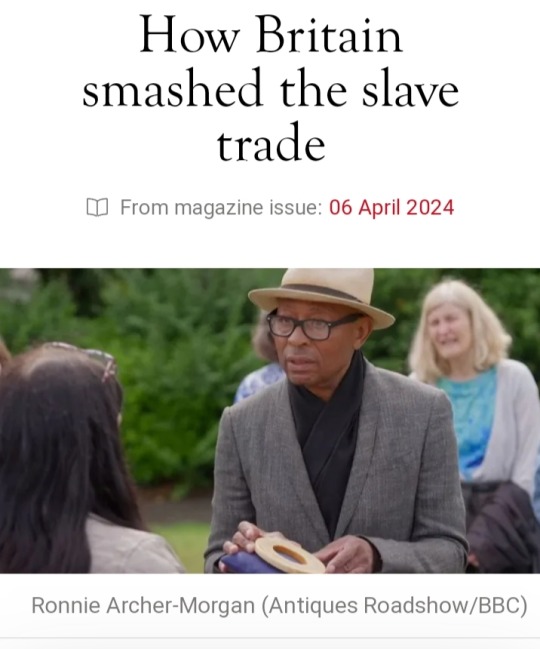
It was bound to happen sooner or later: a guest on the BBC’s Antiques Roadshow presented an artefact, which derived from the slave trade – an ivory bangle.
One of the programme’s experts, Ronnie Archer-Morgan, himself a descendant of slaves, said that it was a striking historical artefact but not one that he was willing to value.
‘I do not want to put a price on something that signifies such an awful business,’ he said.
It’s easy to understand how he feels. The idea of people profiting from the artefacts left over from slavery is distasteful.
Yet, as Archer-Morgan said, it is not that the bangle has no value: it has great educational value.
It should be bought by a museum and displayed in order to demonstrate the complex nature of slavery and as a corrective to the narrative that slavery was purely a crime committed by Europeans against Africans.
The bangle was, it seems, once in the possession of a Nigerian slaver who was trading in other Africans.
It’s a reminder that slavery was rife in Africa long before colonial government.
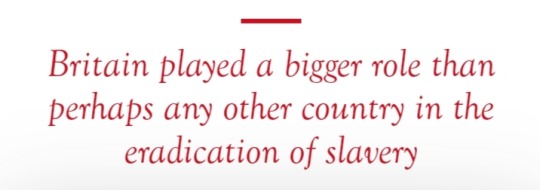
It could also remind us that, though slavery was a global institution, the country that led the world in the rebellion against this barbarism – and played a bigger role than perhaps anyone else in its eradication – was the United Kingdom.
Britain did not invent slavery.
Slaves were kept in Egypt since at least the Old Kingdom period and in China from at least the 7th century AD, followed by Japan and Korea.
It was part of the Islamic world from its beginnings in the 7th century.
Native tribes in North America practised slavery, as did the Aztecs and Incas farther south.
African traders supplied slaves to the Roman empire and to the Arab world. Scottish clan chiefs sold their men to traders.
Barbary pirates from north Africa practised the trade too, seizing around a million white Europeans – including some from Cornish villages – between the 16th and 18th centuries.
It was in fear of such pirates that the song ‘Rule Britannia’ was written: hence the line that ‘Britons never ever ever shall be slaves.’
Even slaves who escaped their masters in the Caribbean went on to take their own slaves.
The most concerted campaign against all this was started by Christian groups in London in the 1770s who eventually recruited William Wilberforce to their campaign, and parliament went on to outlaw the slave trade in 1807.
British sea power was then deployed to stamp it out.
The largely successful British effort to eradicate the transatlantic slave trade did not grow out of any kind of self-interest.
It was driven by moral imperative and at considerable cost to Britain and the Empire.
At its peak, Britain’s battle against the slave trade involved 36 naval ships and cost some 2,000 British lives.
In 1845, the Aberdeen Act expanded the Navy’s mission to intercept Brazilian ships suspected of carrying slaves.
Much is made about how Britain profited from the slave trade, but we tend not to hear about the extraordinary cost of fighting it.
In a 1999 paper, US historians Chaim Kaufmann and Robert Pape estimated that, taking into account the loss of business and trade, suppression of the slave trade cost Britain 1.8 per cent of GDP between 1808 and 1867.
It was, they said, the most expensive piece of moral action in modern history.
The cost of fighting the slave trade cancelled out much, if not all of Britain’s profits from it over the previous century.
There are those who continue to demand reparations for slavery from the UK government and other western powers, yet they rarely, if ever, acknowledge Britain’s role in all but eradicating the evil of the transatlantic slave trade, a cause on which we spent the equivalent of £1.5 billion a year for half a century.
Britain’s role in hastening slavery’s extinction is a remarkable achievement.
It’s astonishing that we have forgotten it almost entirely in the 21st century.
It would be difficult to find anyone in the world whose ancestral tree does not somewhere extend back to a slave-trader.
Huge numbers of us, too, will have been partly descended from slaves.
Britain should not minimise or deny the extent to which it traded slaves to the colonies in the early days of Empire.
But it is also important to remember the thousands who served and died with the West Africa Squadron while seizing 1,600 slave ships and freeing some 150,000 Africans.
We must examine and remember everything about the history of the slave trade, including the forces – moral and military – that eventually brought it to an end.
It’s profoundly worrying that slavery evolved to be a near-universal phenomenon among human societies and inspiring that it came to be all but eradicated within a single human lifespan.
#Britain#slave trade#Antiques Roadshow#Ronnie Archer-Morgan#ivory bangle#artefacts#Rule Britannia#William Wilberforce#Aberdeen Act#slavery#suppression of slave trade#moral action#transatlantic slave trade#BBC
12 notes
·
View notes
Text

I was an infidel and now I deserve to be punished.
#hijab#arab men#black owned#nbwo#white women black men#arab superiority#arab master#islamic#interracial breeding#interracial snowbunny#mnwo#muslim supremacy#muslim superiority#bbc breeding#submisive and breedable#breeding pet#cnc k!nk#free use cnc#cnc free use#rough cnc#cnc kidnapping#cnc stalking#thicc white women#white girls gone black#say no to white bois#katy perry#roleplay#slap my face#bd/sm slave#slap my ass
197 notes
·
View notes
Text
The first chapter of T.E. Lawrence's autobiographical Seven Pillars of Wisdom is some of the best writing I've encountered in ages. He conveys how grueling the conditions were during the WWI Arab Revolt, not with descriptions of weather or terrain or bloodshed, but by their psychological effects. There's almost a grotesque beauty in the way he describes just how mentally unwell they were.
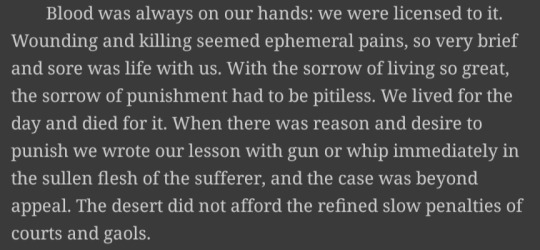
I've put the entirety of the first chapter below the cut because literally the whole thing makes me insane.
As time went by our need to fight for the ideal increased to an unquestioning possession, riding with spur and rein over our doubts. Willy-nilly it became a faith. We had sold ourselves into its slavery, manacled ourselves together in its chain-gang, bowed ourselves to serve its holiness with all our good and ill content. The mentality of ordinary human slaves is terrible—they have lost the world—and we had surrendered, not body alone, but soul to the overmastering greed of victory. By our own act we were drained of morality, of volition, of responsibility, like dead leaves in the wind.
-
Some of the evil of my tale may have been inherent in our circumstances. For years we lived anyhow with one another in the naked desert, under the indifferent heaven. By day the hot sun fermented us; and we were dizzied by the beating wind. At night we were stained by dew, and shamed into pettiness by the innumerable silences of stars. We were a self-centred army without parade or gesture, devoted to freedom, the second of man’s creeds, a purpose so ravenous that it devoured all our strength, a hope so transcendent that our earlier ambitions faded in its glare.
The everlasting battle stripped from us care of our own lives or of others’. We had ropes about our necks, and on our heads prices which showed that the enemy intended hideous tortures for us if we were caught. Each day some of us passed; and the living knew themselves just sentient puppets on God’s stage: indeed, our taskmaster was merciless, merciless, so long as our bruised feet could stagger forward on the road. The weak envied those tired enough to die; for success looked so remote, and failure a near and certain, if sharp, release from toil. We lived always in the stretch or sag of nerves, either on the crest or in the trough of waves of feeling. This impotency was bitter to us, and made us live only for the seen horizon, reckless what spite we inflicted or endured, since physical sensation showed itself meanly transient. Gusts of cruelty, perversions, lusts ran lightly over the surface without troubling us; for the moral laws which had seemed to hedge about these silly accidents must be yet fainter words. We had learned that there were pangs too sharp, griefs too deep, ecstasies too high for our finite selves to register. When emotion reached this pitch the mind choked; and memory went white till the circumstances were humdrum once more.
Such exaltation of thought, while it let adrift the spirit, and gave it licence in strange airs, lost it the old patient rule over the body. The body was too coarse to feel the utmost of our sorrows and of our joys. Therefore, we abandoned it as rubbish: we left it below us to march forward, a breathing simulacrum, on its own unaided level, subject to influences from which in normal times our instincts would have shrunk. The men were young and sturdy; and hot flesh and blood unconsciously claimed a right in them and tormented their bellies with strange longings. Our privations and dangers fanned this virile heat, in a climate as racking as can be conceived. We had no shut places to be alone in, no thick clothes to hide our nature. Man in all things lived candidly with man.
The Arab was by nature continent; and the use of universal marriage had nearly abolished irregular courses in his tribes. The public women of the rare settlements we encountered in our months of wandering would have been nothing to our numbers, even had their raddled meat been palatable to a man of healthy parts. In horror of such sordid commerce our youths began indifferently to slake one another’s few needs in their own clean bodies—a cold convenience that, by comparison, seemed sexless and even pure. Later, some began to justify this sterile process, and swore that friends quivering together in the yielding sand with intimate hot limbs in supreme embrace, found there hidden in the darkness a sensual coefficient of the mental passion which was welding our souls and spirits in one flaming effort. Several, thirsting to punish appetites they could not wholly prevent, took a savage pride in degrading the body, and offered themselves fiercely in any habit which promised physical pain or filth.
I was sent to these Arabs as a stranger, unable to think their thoughts or subscribe their beliefs, but charged by duty to lead them forward and to develop to the highest any movement of theirs profitable to England in her war. If I could not assume their character, I could at least conceal my own, and pass among them without evident friction, neither a discord nor a critic but an unnoticed influence. Since I was their fellow, I will not be their apologist or advocate. Today in my old garments, I could play the bystander, obedient to the sensibilities of our theatre … but it is more honest to record that these ideas and actions then passed naturally. What now looks wanton or sadic seemed in the field inevitable, or just unimportant routine.
Blood was always on our hands: we were licensed to it. Wounding and killing seemed ephemeral pains, so very brief and sore was life with us. With the sorrow of living so great, the sorrow of punishment had to be pitiless. We lived for the day and died for it. When there was reason and desire to punish we wrote our lesson with gun or whip immediately in the sullen flesh of the sufferer, and the case was beyond appeal. The desert did not afford the refined slow penalties of courts and gaols.
Of course our rewards and pleasures were as suddenly sweeping as our troubles; but, to me in particular, they bulked less large. Bedouin ways were hard even for those brought up to them, and for strangers terrible: a death in life. When the march or labour ended I had no energy to record sensation, nor while it lasted any leisure to see the spiritual loveliness which sometimes came upon us by the way. In my notes, the cruel rather than the beautiful found place. We no doubt enjoyed more the rare moments of peace and forgetfulness; but I remember more the agony, the terrors, and the mistakes. Our life is not summed up in what I have written (there are things not to be repeated in cold blood for very shame); but what I have written was in and of our life. Pray God that men reading the story will not, for love of the glamour of strangeness, go out to prostitute themselves and their talents in serving another race.
A man who gives himself to be a possession of aliens leads a Yahoo life, having bartered his soul to a brute-master. He is not of them. He may stand against them, persuade himself of a mission, batter and twist them into something which they, of their own accord, would not have been. Then he is exploiting his old environment to press them out of theirs. Or, after my model, he may imitate them so well that they spuriously imitate him back again. Then he is giving away his own environment: pretending to theirs; and pretences are hollow, worthless things. In neither case does he do a thing of himself, nor a thing so clean as to be his own (without thought of conversion), letting them take what action or reaction they please from the silent example.
In my case, the effort for these years to live in the dress of Arabs, and to imitate their mental foundation, quitted me of my English self, and let me look at the West and its conventions with new eyes: they destroyed it all for me. At the same time I could not sincerely take on the Arab skin: it was an affectation only. Easily was a man made an infidel, but hardly might he be converted to another faith. I had dropped one form and not taken on the other, and was become like Muhammed’s coffin in our legend, with a resultant feeling of intense loneliness in life, and a contempt, not for other men, but for all they do. Such detachment came at times to a man exhausted by prolonged physical effort and isolation. His body plodded on mechanically, while his reasonable mind left him, and from without looked down critically on him, wondering what that futile lumber did and why. Sometimes these selves would converse in the void; and then madness was very near, as I believe it would be near the man who could see things through the veils at once of two customs, two educations, two environments.
#t e lawrence#seven pillars of wisdom#the next couple chapters were were really hard for me 😔#i don't understand geography and politics in the Arabian peninsula 😔
32 notes
·
View notes
Note
Loved your caption where you had Indian hunks draining white men of muscles, taking over the gym! Would love some Arabs to drain white men, get big, take over. Fucking love cocky Arabs dominating weak whites.
"Enjoy seeing me with all your muscles faggot?” amir said while showing off all his stolen muscle to the drained boy who now had an erection.

Amir had always felt white boys didn’t deserve to be muscular and were instead meant to be weak and submissive to their Arab superiors.
One day he found some sort of gemstone in his attic that allowed him to transfer physical attributes from one person to another.
he began to use it to steal height and muscle from white men to make them small and weak while he became big and strong the best part was the gemstone also changed reality so no one would notice besides him and his victims.
he would soon begin to use the gemstone to help other Arab men as he transferred the muscles of white boys to them with the streets soon flooded with Big Arab men with their drained white boy slaves.
79 notes
·
View notes
Text
💚

#arabophile#arabophilia#muslim new world order#arab brotherhood#brother pharaoh ap#ǰoin islamic brotherhood#white slave for arab#straight to gay#arab men#إنضم إلى جماعة الإخوان المسلمين#arabization#arab superiority#arab master
52 notes
·
View notes
Note
[Huey Zoomer anon]
Okay we started in the dms, but still
THESE ARE THE FUCKERS WHO PURPOSELY DESTROYED OUR CONNECTIONS TO AFRICA AND SENT US TO GET RAPED BY THE WHITE MEN YOU STUPID FUCKING BITCH https://www.tumblr.com/siryouarebeingmocked/760598719160795136
WOMAN KING IS A JEWS LIONIZING THE NAZIS MOVIE FOR AFRICAN AMERICANS!
I need to summon the spirits of all African Americans slave ancestors who were the first to got off the boat. Given them metal bats, and send them to hunt down the dumbass descendants that glorify the Dahomey that KIDNAPPED, BRAIN DAMAGE THEM, AND KILL HALF OF THEIR SLAVE IN HUMAN SACRIFICES UP TO THE VICTORIAN ERA!
now I have to wait 2 months and week for a decent historical fiction take on a black historical figure take with ac shadows
*Cry in the a pillow with a Jack Daniel on my side with how fucking low standards are for black characters are now*
The Dahomey didn’t stop slavery until the French kicked their asses in 1894!
I think I need to kiss so many Yoruba elders feet as a apology for the DISGUSTING film that idiots made
Please Yoruba, I know we are not part of you anymore. But help me to heal the bridge between each other for a better relationship in the future!
I still will never understand how anyone thought making that movie and making the dahomey amazons look like heroes instead of the monsters and slavers who were fans of human sacrifice they were.
It's not like the information is hard to find, or new.
I need to summon the spirits of all African Americans slave ancestors who were the first to got off the boat. Given them metal bats, ect
You could probably get some of the folks from the Trans-Saharan slave trade involved in that too, pretty much every Arab nation was taking slaves from Sub Saharan Africa.
And that one was running long before and long after the Trans-Atlanitc one was going on.
the Dahomey that KIDNAPPED, BRAIN DAMAGE THEM, AND KILL HALF OF THEIR SLAVE IN HUMAN SACRIFICES UP TO THE VICTORIAN ERA!
Probably went on longer than that, they just kept it under wraps, not like slavery wasn't still legal and widely practiced in the middle east and Africa till a good while after WW1 was over in lots of places there.
Nobody ever really brings that up for some reason tho.
now I have to wait 2 months and week for a decent historical fiction take on a black historical figure take with ac shadows
From everything you've showed me so far it should be worth the wait, just avoid fandom spaces because those people can be insufferable.
I think I need to kiss so many Yoruba elders feet as a apology for the DISGUSTING film that idiots made
You don't need to apologize for that, the people that made that film probably should though.
They really should have just invented a fictional place and people for the story and left the name dahomey out of everything, but they went the foolish and dumb route instead.
2 notes
·
View notes
Text
By: Richard Hanania
Published: May 14, 2023
The topic of black crime has taken over Twitter. It all started when Elon Musk responded sympathetically to a Tweet that presented data showing black-on-white crime is the most common form of interracial violence. The original tweet was completely correct, and you can see Noah Carl for some of the sophistry that has been used to try to deny or obfuscate on the underlying facts.
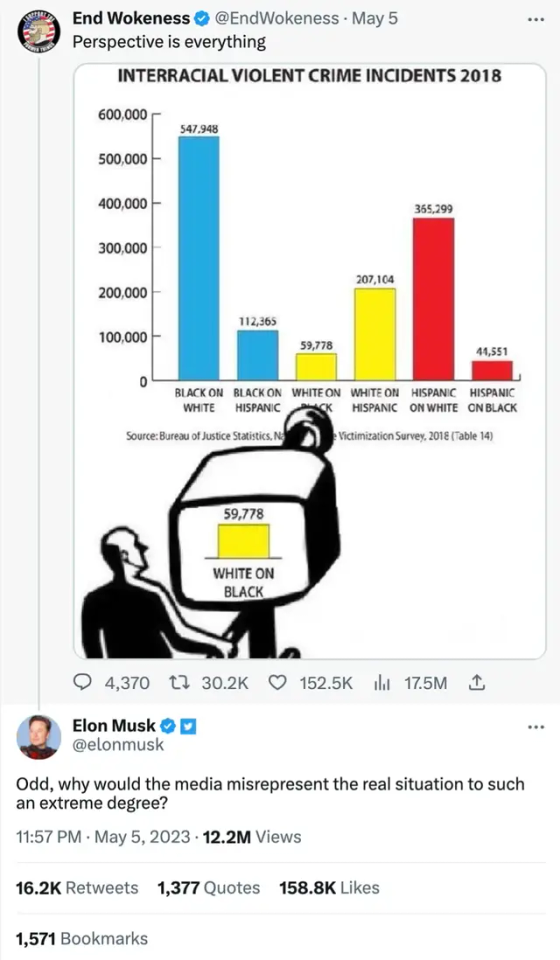
I personally don’t have the patience for taking part in these kinds of arguments, at least in the way that Noah is engaging here. It’s like the people who spend all their time arguing with trans and feminists by pointing to *scientific studies* showing that boys have penises and girls have vaginas. Men have more grip strength. Scientists just proved it! I guess someone has to do it, and I’ve run into some actual human beings (on the internet anyway) who tell me that they accepted the blank slate view of sex until they looked at the data. This makes me sad. But since the data does convince some people, I guess I’m glad someone is providing it.
Race and crime is similar. The numbers are there if you need them. I suppose foreigners might. But I grew up just outside of Chicago, and data on black criminality is to me just as unnecessary as sex comparisons of grip strength. Chicago is about a third black. Like many midwestern cities, it is extremely violent, with nearly all of the crime concentrated in black neighborhoods. When crime does spill over into the nicer areas, it’s committed by the people from those neighborhoods.
I knew many family friends who were Middle Eastern immigrants and store owners in the city. Every now and then, some distant relation or acquaintance would get their store looted or, in at least one instance I remember, shot and killed. Michael Jordan’s greatness was much appreciated and respected but its consequences used to fill the community with fear, because another championship tended to create another possibility that stores would go up in flames. The Arabs would speak in shorthand. “What happened to Walid’s store?” “You know, the blacks…” “Ah.” Actually, they would say “the slaves,” if you want to really know how Arabs talk.
Here’s the thing: while only immigrants and white proles explicitly discuss this aspect of their reality, every single person within the orbit of the city behaves as if they know the truth. No matter who you are, unless you’re one of the residents of those communities, your life is organized around avoiding the pathologies of the inner city. If you’re a desperate immigrant, you might open up a store, put up a “We Take EBT” sign, and take the risk of being shot. White Americans are less inclined to do this, so they instead just flee black neighborhoods and do what they can to get their kids out of black schools. They’ll make any commute or pay whatever tuition is necessary. No one is confused about this — liberals are correct that entire swaths of a major city don’t end up with zero white people by accident. They just attribute this to “racism” rather than the desire not to be sexually assaulted or physically harmed.
I’ve been talking about Chicago, but the same things are true for Milwaukee, Detroit, St. Louis, Cleveland, Baltimore, and countless other major cities. It’s also true for the cities where American elites and policymakers live like Washington, DC, which is why I’m always amused by theories that say they are actually acting in their own interests by coddling criminals. Other than blacks themselves, no group would benefit more from solving our crime problem than wealthy urban whites.
We can therefore ignore those who deny the reality of black crime. They’re either too stupid or dishonest to engage with. Among others on the left, there has been an acceptance of reality combined with pleas to simply frame the issue differently.
When liberals talk about perspective here, what they usually mean is that the likelihood of a white person being victimized by a black person is small in an absolute sense, so why worry about it? It would be a fine argument, except that we are constantly told to obsess over the harms done by police shootings, white supremacist violence, and vigilantes falsely accusing innocent black men of crimes.
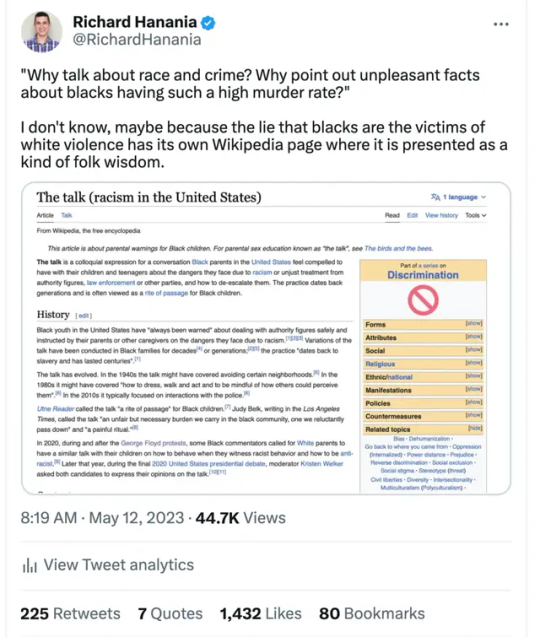
I thought about showing you NYT and CNN headlines implying that blacks have to live in constant fear due to racism. But you’ve probably seen them, and instead I’ll share this clip showing how the topic was addressed a few years ago on a major network TV show.
youtube
As a digression, I would recommend checking out a few episodes of A Million Little Things if you want to see the horror that is the PC therapeutic slop that normies are being fed these days, but that’s a discussion for a different time.
So the crime debate has been going something like this.
Conservatives: Look at all the black-on-white crime.
Liberals: Get some perspective man. It’s nothing compared to the chances of being murdered by your own race. Not to mention heart attacks or covid. These are very small numbers.
Conservatives: You guys are the ones telling us blacks are living in constant fear. Stop doing that.
Now, when having these debates, what’s frustrating is that people are usually talking past one another. There’s not like one guy named “conservatives” and one guy named “liberals.” The liberals who are telling you to have some perspective on black crime often aren’t the same ones pushing the narrative that blacks should live in fear of whites. It’s easy to “own” the other side by putting together views of different people and finding contradictions.
That being said, the myth of substantial white-on-black violence is so deeply embedded in the culture that it’s a storyline in network TV shows. I think it’s fair to ask people to take a position on it. If you dislike racists on Twitter focusing too much on black-on-white crime, know that they are closer to the truth than the race obsessives on the other side, and have a lot less power.
One odd thing about these calls for perspective is that when liberals say that intra-racial crime is more common than crime that crosses group boundaries, what they are essentially saying is don’t worry about black crime, because the victims are overwhelmingly black people. But wait! Since when are liberals uninterested in problems that disproportionately affect blacks? These are the people who write serious NYT think pieces about how national parks are too white. They now turn around and say, let’s not talk too much about murder, because blacks are the victims? It’s a very odd thing, and it’s hard for me to even steelman their lack of interest in solving this issue as they obsess over every other black grievance, real or imagined.
Some years ago I noticed that fact checkers started providing “perspective” on claims rather than simply saying whether they were true or false. Of course, what perspective to take on facts is a huge part of what political discourse is about. Do blacks commit a lot of violence against whites? Compared to the number of cancer deaths, no. But in the context of a comparison to white-on-black violence, absolutely. One can conduct a similar analysis of issues like covid, terrorism, and school shootings.
For me, I like cost-benefit analysis as the way to understand what problems are worth worrying about and what we should be doing about them.
Black-on-white violence is not the biggest issue in the world, but it is useful to talk about in order to challenge narratives that pose much more serious problems. Arguments about supposed racism committed by whites against blacks are why we can’t effectively fight crime in this country and why we can’t have freedom of association or meritocratic criteria in hiring. The belief in white racism as a major factor in American life is the force that distorts all of policymaking and culture. Any arguments that are effective at discrediting that narrative are worth making.
And no, I don’t consider acting on statistical realities to be a kind of racism society should solve. Once you remove reactions that are based on group behavior, and private preferences that are none of the government’s business in a free society, the remaining “racism” in the United States against blacks is negligible, and more than balanced out by the ways in which they are advantaged.
The truth of the matter is we have a disgraceful amount of crime in the US, and the costs are not simply a matter of the number of people robbed, raped, and killed. It’s also a tragedy that what could be some of the most valuable urban real estate in the country is basically uninhabitable. In fact, part of the reason that black-on-white violence is rare in this country is because whites have overwhelmingly fled places where blacks live due to the threat of violence.
Other pathologies of American life, like NIMBYism, which drives up the cost of housing, are also downstream of the crime issue. If you’re a resident of Tokyo, you don’t need to worry about greater density leading to a decline in public safety, the way that Americans have to.
There’s no “perspective” one can take from which a reasonable observer won’t find that inner city crime is a major problem, and something we should do our best to solve. The chart below shows the ten American cities of at least 100,000 people that have the highest murder rates, and how they compare to the most violent countries in the world. The murder rates for cities come from CBS, while the country data comes from the World Bank.
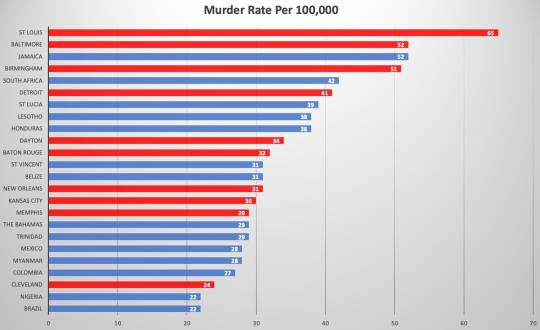
[ How the ten most violent US cities with a population over 100,000 compare to the most violent countries in the world. Red is US cities, blue is countries. ]
You might be saying that it’s unfair to compare cities to entire countries, since urban areas might have concentrated violence. Yet the most violent countries in the world tend to be small. For example, St Louis, which is number one in murder in the chart above, has 293,000 people. That’s a larger population than St Lucia (180,000) and St Vincent (104,000), which are shown on the graph. Detroit has 632,000 people, making it more than 50% larger than either the Bahamas (407,000) or Belize (400,000). New Orleans (384,000) and Cleveland (373,000) are close behind. So this isn’t a matter of cherry-picking areas with minuscule populations and making them look bad. These cities are the size of small countries, which means we are pretty much comparing apples-to-apples in many of these cases. And if you want to make a real apples-to-apples comparisons, try contrasting American cities to those in other first world countries, like London.
As I argue in my articles on El Salvador, any polity that has a high enough murder rate needs to make solving crime its number one priority. This was true for that nation before Bukele came along, as it is for major American cities today. It’s not a big mystery how to do this, it’s just politically difficult, because literally everything that works is considered racist. You need more cops, more prisons, and more use of DNA databases and facial recognition technology. You can’t have concerns about disparate impact in a world where crime is so overwhelmingly committed by one group. And yes, liberals are right about one thing, which is that gun laws matter too.
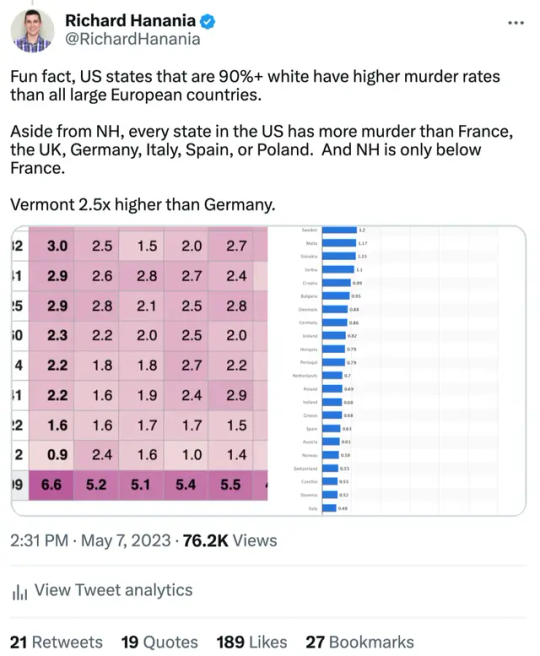
But the left is so out of its mind on everything touching on race that even though they’re right that gun laws matter, when it comes to actually enforcing them, they tend to shy away from doing so for the obvious reason.
While I support policies that can make incremental improvements, actually solving our crime problem to any serious extent would take a revolution in our culture or system of government. Whether you want to focus on guns or the criminals themselves, it would involve heavily policing, surveilling, and incarcerating more black people. If any part of you is uncomfortable with policies that have an extreme disparate impact, you don’t have the stomach for what it would take. And, unlike some, I’m not naive enough to think that non-criminal blacks would end up grateful towards those who took the steps necessary to make their communities safer.
Dealing with the crime issue is complicated for reasons that go deep to the heart of the American psyche, which means there’s little hope that things will change any time soon. Until they do, we should continue to at the very least push back on the most malicious lies being told about race in America.
#Richard Hanania#interracial violence#interracial violent crime#violent crime#black violence#religion is a mental illness#Youtube
4 notes
·
View notes
Text
The Life of The Prophet Muhammad(pbuh): The Treaty of Hudaybiyah and Calling the Great States of the World to Islam
The Battle of Muta
(8th year of the Migration, the month of Jumadal-Ula / AD 629)
The Prophet sent letters and envoys not only to the rulers of the big states and invited them to Islam but also to the tribes and nations that were subject to them. He sent Harith b. Umayr al-Azdi with a letter to the governor of Busra (now Hawran). Busra was a principality. Its governor and people were Arabs but they were Christians and they were subject to the Byzantine state in terms of foreign policy.
When Harith, the envoy of the Prophet arrived at Muta, one of the villages of Balqa’, a town of Damascus, he was taken to the presence Shurahbil b. Amru’l-Ghassani, the governor of Damascus of the Byzantine Kaiser. When Shurahbil heard that Harith was the envoy of the Prophet, he killed Harith brutally.
When the Messenger of God heard that his envoy had been killed, he became very grieved. The Companions felt grieved, too. No envoy of the Prophet had been killed up to that time.[2]Harith was the first and last envoy of the Messenger of God that had been killed. Therefore, this brutal murder was very important. It was an ugly act that hurt and offended the Messenger of God and the Muslims. With this despicable act, Shurahbil showed his hatred and enmity against Islam and violated the basic international principle, “Do not kill the envoy.”
After evaluating the incident, the Messenger of God formed an army. He appointed Zayd b. Haritha, his freed slave, to command the army that consisted of three thousand mujahids.
After the Messenger of God stated that he appointed Zayd b. Haritha as the commander, he said, “If Zayd is martyred, let Jafar b. Abu Talib replace him. If Jafar is martyred, let Muslims choose an appropriate person as their commander”
Sagacious Muslims realized the subtle meaning in the Prophet’s sentences. They said by crying, “O Messenger of God! We wish they would stay alive and we would benefit from them.” The Messenger of God kept silent.
What about those who would be the commanders? They knew that they would be martyred due to the words of the Messenger of God, but they did not hesitate at all to go there and they obeyed the order of the Prophet willingly. Yes, they went to death consciously. However, this death would be different from normal deaths; and it would take them to the highest rank of life: martyrdom. The only desire they had in their hearts was to elevate the word of God; the only desire in their spirits was martyrdom. That was what made them go on the expedition enthusiastically.
The Islamic Army is Seen off Madinah
The Islamic army of three thousand people was in a single body and waiting for the command to proceed. Meanwhile, the Prophet gave Zayd a white standard and said to him, “Go up to the place where Haris b. Umayr was killed. Ask them to become Muslims. If they agree, it is all right but if they do not agree, fight them relying on the help of God.”
It is possible to understand only from this advice of the Prophet that the Islamic army set off with the lofty intention of asking them to be Muslims, free from the feeling of revenge.
Many Muslims went to the Hill of Wada together with the Messenger of God to see the mujahids off. The Messenger of God stopped there and said to the mujahids, “I advise you to fulfill the orders of God, to keep away from His prohibitions, to treat people who are with you well and do them favors. Fight in the way of God with His name. Do not misuse booty! Do not break your promises! Do not kill little children! Do not kill women and old men! Do not cut down or burn trees! Do not demolish houses! You will find some Christians who have retired into seclusion in churches and worshipping there. Do not touch them!” After that, he said to Zayd b. Haritha:
“When you confront the enemy, offer them to accept one of the following three things. If they accept one of them, do not touch them.
Invite them to migrate to Madinah, which is the land of immigrants. If they accept it, tell them that they will have the rights that muhajirs have and that they will be obliged to do what muhajiras are obliged to do.
If they become Muslims and want to live in their own land, tell them that they will be like Bedouin Arab Muslims and they will have the same rights and obligations as Bedouin Arab Muslims, that they will not be given anything from the booty and that only those who take part in the war together with the Muslims will be given their share of the booty.
If they do not want to be Muslims, tell them to pay jizya (tax paid by Christians and Jews). If they accept to pay it, do not touch them. If they do not accept to pay jizya, fight them by relying on the help of God.
If the people of the castle or the town you have besieged ask you to accept their surrender based on the judgment of God, do not accept their surrender based on the judgment of God but based on your judgment. You cannot know what God has judged for them and you might not make the same judgment.
If the people of the castle or the town you have besieged ask you to give them the guarantee of security of God and His messenger, do not give them the guarantee of security of God and His messenger but your and your friends’ guarantee of security. If you break your promise of security, it is less evil for you than breaking the promise of God and His messenger.”
After giving them the orders and advice below, the Messenger of God said good-bye to the mujahids. The Muslims who were there to see them off said, “May God protect you all kinds of danger and bring you back safe and sound.”
Abdullah b. Rawaha greeted the Messenger of God, who was returning to Madinah, by saying, “Peace be upon the person whom I said goodbye to in the data grove behind, the best person who sees people off and the best friend!”
The Islamic army was seen off among tears coming from the hearts. The white standard given to them by the Messenger of God was waving above them magnificently. Their hearts were pounding excited by the words and the spirit of the Messenger of God. Where were those mujahids, who were travelling into the vast center of the desert going? Seemingly, they were going to the principality of Shurahbil b. Amr near the border of Syria in order to call him to account. In fact, they were not. They were going there to call the arrogant army of the giant Byzantine Empire.
Shurahbil Makes Preparations
The mujahids, whose hearts were full of excitement and enthusiasm for jihad, were proceeding on their horses and camels by trying to pass through the desert.
Meanwhile, Shurahbil heard that the Islamic army had set off from Madinah.
Shurahbil started to make preparations at once. He informed Heraklius, the Kaiser, about the situation and asked for help. Meanwhile, he sent a military unit as an advanced guard under the command of his brother against the Islamic army, which had stopped at Wadil-Qura. The mujahids defeated them and killed Sadus, the commander of the unit. This defeat intimidated Shurahbil.
After getting rid of the first attack, the Islamic army left Wadil-Qura and went to Maan, near Damascus. When they arrived at Maan, they were startled by the news they heard: “Heraklius, the Byzantine Emperor, was coming toward the south with one hundred thousand soldiers. His army was equipped with very good weapons.”
What they heard was not a lie. Hazrat Zayd wanted to hear the view of the mujahids. Most of them had the following view:
“Let us write the Messenger of God (pbuh) about the number of the soldiers of the enemy and ask him to send us soldiers or to tell us what he wants us to do.”
There was someone among them who had not spoken but kept silent. Now it was time for him to speak. He was Abdullah b. Rawaha, the great poet and unique hero. He gave Zayd a heroic answer by saying, “By God, what you do not want now is martyrdom, which we desired and set off for. We fight the enemy not because we have more horses or soldiers than them but thanks to the power given to us by our religion, with which God honored us. We should go and fight them. We will have either of the two good things: martyrdom or victory!”
The mujahids listened to those sincere words as if they were not coming from Abdullah b. Rawaha but from another realm. Their hearts, which were hot with the love of belief and jihad were inflamed luminously by those words. They said, “By God, Rawaha is right” and started to proceed toward the enemy with courage.
#allah#god#islam#muslim#quran#revert#convert#convert islam#revert islam#reverthelp#revert help#revert help team#help#islamhelp#converthelp#how to convert to islam#convert to islam#welcome to islam
4 notes
·
View notes
Text

Allah calls Himself Al-Ahad— The Only One, the Unique— on one occasion in the Quran. Al-Ahad is the One who was, is, and will ever remain alone. He is indivisible and the essence of unity, and nothing or no one can ever be equal to Him in essence in all His beautiful attributes!
The Sole One, The Unity
Ahad comes from the root hamza-haa-daal, which points to two main meanings. The first meaning is to be the only one and sole. The second main meaning is to unite or unify.
This root appears 85 times in the Quran in 2 derived forms. Examples of these forms are ahadun (“anyone”), ahadukum (“one of you”) and ihdaa (“any, one”).
Linguistically what is ahad cannot be divided into parts, whereas that which is waahid appears to be divisable into separate parts. Some (scholars) differentiated between al-Waahid and al-Ahad by saying that al-Waahid refers to His being one in His essence only, whilst al-Ahad means that He is one in both His essence and His attributes [Tafseer Asmaa’ Allaah by al-Zajjaaj, p. 58]
And it was said that al-Waahid means He is unique in His essence and does not have any peer or rival, and al-Ahad is unique in His attributes. So al-Waahid is one in and of Himself, and al-Ahadmeans being one in His attributes. Al-Ahad is one of the attributes of Allah which belong uniquely to Him, and in which nothing else has a share. (Lisaan al-‘Arab –Ahad – 1/35; wahida 8/4779 – 4783).
Allah is Al- Ahad and Al-Waahid, He is unique in being one in both His essence and His attributes!
Al-Ahad Himself says: . . . Say: He is Allah [who is] One. [Quran, 112:1]
An Inspiring Conversion
Bilal radiyallahu anhu was a slave of Ummayah Ibn Khalaf, who was furious when he found out about his belief in the Oneness of Allah. Each day he would put Bilal in the heat of the sun denying him food or water and he ordered others to place a large rock on his chest so he could hardly breath. He continued crushing him saying, “I will never stop torturing you, until either you die or you declare kufr in Muhammad (saw) and you return back to worshipping the Lat and Uzzah.” In extreme hardship and under the pressure of the rock on his chest Bilal spoke his famous words of unshakeable faith which are an inspiration to all believers:
“Ahadun Ahad”, “The One! The One!” After eleven days of torture Abu Bakr radiyallahu anhu bought Bilal and set him free. The Prophet salallahu alayhi wa sallam himself soon selected Bilal for one of the most honourable tasks: the mu’addhin, the caller of the adhaan, every day proclaiming the Oneness of Allah, Al-Ahad!
How Can You Live By This Name?
1. Feel the testimony of faith.
Understand the shahada by studying its meaning and implications. Reflect on your relationship with the shahada and how both your limbs and heart should be connected to it. Remind yourself of all those believers who sacrificed all they by proclaiming the testimony of faith. Think of the wife of Firawn, the People of the Trench, the early Muslims of Makkah and all those men and women who are being pursued just for having faith and feel the power of the shahada! And they resented them not except because they believed in Allah[Quran, 85:8]
Next time you pray really feel it when you say laa ilaaha illAllah, He is the Only!
2. Fight your desires.
We know Al-Ahad is the Only but do we make Him the Only we listen to, work for, ask from and submit to in our daily life? How many times do you do something you think is important rather than what is truly important in the eyes of Al-Ahad? Fight your ego and make pleasing Him your only goal. Have you seen he who has taken as his god his [own] desire...[Quran, 45:23]
3. Repeat the shahada throughout the day.
The Messenger of Allah salallahu alayhi wa sallamsaid: The best Dhikr (remembering Allah) is La ilaaha illallah and the best supplication is Al-Hamdu Lillah.[At-Tirmidhi, An-Nasa’i and Ibn Majah]
4. Make your intentions for Him only.
Imagine a cup of white, pure milk, if there was one drop of blood or dirt in it, the whole colour would change and you would not drink it! Once you understand the shahada you know your intentions should be for Allah only. Think about the intention you have with every deed. For example if you feel angry when someone doesn’t acknowledge what you did for them, examine yourself and think, did I do this purely for Allah or was my intention mixed with something else? Start for one week to make everything you do to please Him only and taste the unique sweetness. When you are working, think you are pleasing Him by taking care if your family, when you are tending the children make the intention you want to raise them to worship Al-Ahad only, when you help someone, help them for the reward of Al-Ahad only!
5. Make surah Al-Ikhlaas your life’s motto!
Apart from reciting it in your prayer, have you ever thought what this virtuous surah means to your daily life? This surah inspires you to sincerity in all you do and live for the Only, Al-Ahad. He rewards your good deeds according to their sincerity, your sincerity is the key to your eternal success and without sincerity all your deeds are worthless! Say, ‘Surely my prayer and my devotion, my life and my death are all for Allah, the Lord of the Worlds. No partner has He, and this is what I have been commanded [Quran, 6:162 ] This means not only act of worship like prayer and fasting, but you should have the intention to please Al-Ahad in spending money, dealing with colleagues, your family etc.
6. Ask Al-Ahad.
Ask Him, turn to Him and beg Him only for your every need. Ask Him to help you to purify your intentions.
Wallahu ta’alaa ‘alem.
O Allah, Al-Ahad we know that You are the Only. Bless us with pure intentions and help us to do those deeds most pleasing to You. Guide us to understand, live, and die by the shahada so the fire cannot touch us, and we will enter Your everlasting gardens, ameen!
#allah#islam#revert help team#asma al husna#revert help#muslim#ayat#daily#allah’s name#dua#pray#prayer#salah#muslimah#hijab#religion#reminder#mohammed#new revert#new convert#new muslim#how to convert islam#converthelp#convert islam#become a muslim#welcome to islam#hadith#daily ayat#prophet#god
5 notes
·
View notes